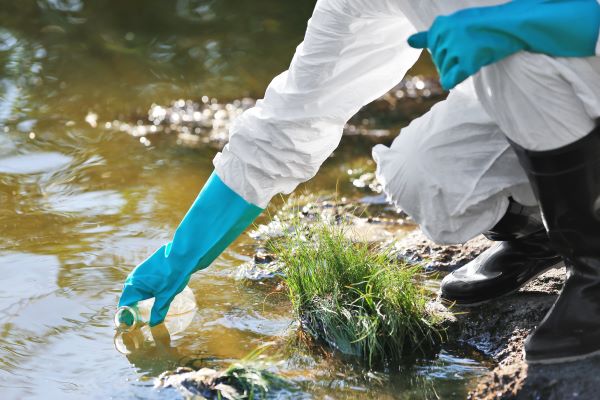If you’re passionate about the environment and have an interest in the natural and physical sciences, a career in environmental science may be for you. Below we’ve ranked the 10 best online environmental science bachelor’s degree programs students should consider if they want to make a career out of their passion for environmental protection and preservation.

What Is a Degree in Environmental Science?
Environmental science is an interdisciplinary area of work and study that applies the principles and practices of sciences like biology, physics and geography to the natural environment. Environmental problems and the search for effective, often innovative solutions are critical parts of the field of environmental science.
Degrees in environmental science are college-level programs of study with curricula that are dedicated to the field of environmental science. Naturally, an online environmental science bachelor’s degree will include plenty of environmental science courses that cover topics ranging from environmental theory to practices of environmental sustainability and renewable energy generation. Environmental science degrees exist at every level, from associate’s through doctoral degree programs.
RELATED: The 20 Easiest Online Bachelor’s Degrees
Not all degree programs related to environmental studies are environmental science degree programs. Our list of the best online environmental science bachelor’s degree programs includes traditional environmental science degrees as well as degrees in environmental sustainability, environmental policy, environmental geosciences, environmental management and environmental studies.
RELATED: What Is a Bachelor’s Degree in Environmental Studies?

Although our list doesn’t include any programs in the field of environmental engineering, which is a subfield of the civil engineering discipline, this design-focused major, too, is worth considering for prospective students who want to develop practical solutions to environmental issues.
Any program related to environmental science will include some science coursework. However, programs with slightly different titles may allow students to focus on distinct areas of interest, such as public policy or sustainable resource management.
What Can You Do With a Degree From an Environmental Science Program?
Because the curriculum of bachelor’s in environmental science degrees tends to be interdisciplinary in nature, environmental science graduates can work in any area that pertains to studying, preserving, protecting or restoring the environment. Land management, renewable energy sources and environmental hazards are among the more popular fields an environmental scientist might pursue.

Some areas of environmental studies may require a more advanced degree beyond the bachelor’s. For example, if you are interested in environmental law, you might major in environmental science as an undergraduate before going to law school to qualify as an environmental lawyer.
RELATED: How Advanced a Degree Do I Need for a Career in Environmental Science?
An environmental scientist or specialist might work in nature centers, nonprofit agencies, environmental consulting firms, research laboratories, government agencies like the Environmental Protection Agency (EPA) or the health and safety field.
RELATED: What Are the 5 Best Careers in Environmental Science?
Which School Offers the Best Online Environmental Science Degree?
Today, online environmental science degrees, as well as degree programs in similar fields of study, are common at four-year colleges and universities. Environmental issues like climate change, finite natural resources and the need for effective pollution management efforts have brought attention to the need for knowledgeable environmental scientists, planners, conservationists, managers and policymakers.
Online environmental science bachelor’s degrees offer students of environmental science convenience and flexibility. Studying online is a particularly good option for working students, adult students going back to school and students juggling family and other obligations.
What to Look for in Online Environmental Science Degree Programs
With so many excellent environmental science degree programs available in online formats, how do you determine which ones are the best? To compile our list of the best online environmental science programs, we looked primarily at four criteria.
The Quality of the Curriculum
Most importantly, we evaluated the curriculum of each environmental science program. What specialized environmental science courses can students expect to take, and how do those courses prepare students for the breadth of jobs available for environmental scientists and specialists?
Most environmental science bachelor’s degree programs include coursework in areas like natural sciences, environmental issues like global warming, renewable energy, applied ecology and the scientific and digital tools, like geospatial technologies, that environmental science professionals utilize in their work.
In particular, we looked at the ways students could customize their online degree –through both formal concentrations and informal elective coursework – so they can build areas of expertise in the aspects of environmental science that most interest them.
Affordability
Another factor we consider in ranking the best online environmental science bachelor’s degree programs is affordability.
Environmental science is a noble pursuit, and environmental scientists and specialists earned a median salary ($76,530 in 2021) that is well above the median wage for all occupations ($45,760), according to the United States Bureau of Labor Statistics (BLS).
Still, environmental scientists and specialists earned a median salary that is several thousand dollars less than that reported for physical scientists as a whole.
RELATED: What Is the Wage Potential with a Degree in Environmental Science?
Many prospective students understandably don’t want to get deep into debt to start their careers as environmental scientists, even if their future earning potential is strong.
We assessed the tuition costs reported for schools that offer a degree in environmental science online. Keep in mind, though, that these tuition rates don’t explain exactly how much you will pay for your degree. Any financial aid you receive will reduce how much you pay now to enroll in an online program, if not the total cost you pay to earn an environmental science bachelor’s degree.
Financial aid for environmental science students may come from many sources, including the institution you attend, the government and external scholarships awarded by third parties like businesses and nonprofit organizations. Loans are a kind of financial aid that must be repaid later – typically with interest – while grants and scholarships are free money toward your online degree.
In assessing affordability, look at the full tuition rates and fees for the online schools you are considering, but take the time to also explore financial aid opportunities. Financial aid packages could potentially make even a school with a high sticker price surprisingly affordable.
Institutional Accreditation
When you’re pursuing an online degree, in particular, you want to know that the college or university you enroll in is legitimate and has a good reputation. Every school on our list of the best online bachelor’s degrees in environmental science is accredited by a regional accrediting organization that is recognized by the Council for Higher Education Accreditation (CHEA).
The Student Online Learning Experience
The best online environmental science programs provide students with educational experiences akin to what you would expect from a traditional, in-person program but with the convenience of online learning.
We looked especially for online environmental science bachelor’s degree programs that include innovative options for completing laboratory coursework in the physical and natural sciences, experiential learning activities, project-based learning and internship and fieldwork opportunities.
1. The Online Bachelor of Science in Environmental Science at American Public University
 American Public University in Charles Town, WV, is part of the American Public University system, along with American Military University.
American Public University in Charles Town, WV, is part of the American Public University system, along with American Military University.
The private, for-profit, online university system offers an online degree that can prepare students to work as environmental scientists in several different areas of concentration.
Core courses in the environmental science degree program at American Public University include biology and chemistry, as well as water science and soil science. Students also take environmental studies courses that focus on policy, regulation, law, ethics and management. With the 46 general elective hours built into the curriculum, students may build expertise in an area of personal or professional interest and pursue a formal minor or certificate. A senior seminar serves as the final program requirement.
Students in American Public University’s program must choose a concentration. A general concentration is an option for students interested in forging their own paths by selecting courses of their choosing from all concentration areas.
Coursework in a Sustainability concentration focuses on resource and energy sustainability. A concentration in Regional and Community Environmental Planning equips students with the skills to assess and solve land use issues. Specializing in Fish and Wildlife Management allows students to focus on resource management and possibly prepare to become fish and wildlife managers. Students who choose the Environmental Technology and Management specialization learn about methods of environmental hazard mitigation and pollution management.
RELATED: What is a Bachelor’s Degree in Sustainability?
Under the current tuition rates, students at American Public University paid a tuition cost of $285 per credit. Active-duty servicemembers and their spouses and dependents, along with National Guard members and Reservists, receive a military grant that reduces the cost per credit hour to $250. Students pursuing an undergraduate degree also receive a university book grant that allows them to access the textbooks and eBooks they need for the program at no cost.
American Public University and the American Public University system as a whole are regionally accredited by the Higher Learning Commission (HLC).
View program details.
2. The Online Bachelor of Science in Environmental Management at Columbia Southern University
 Columbia Southern University‘s College of Safety & Emergency Services offers an online bachelor’s degree in environmental management. A curriculum that includes 12 semester hours of program electives and 42 semester hours of free electives, in addition to the 30 hours of general education courses and 36 hours of required major coursework, gives students plenty of control over their studies.
Columbia Southern University‘s College of Safety & Emergency Services offers an online bachelor’s degree in environmental management. A curriculum that includes 12 semester hours of program electives and 42 semester hours of free electives, in addition to the 30 hours of general education courses and 36 hours of required major coursework, gives students plenty of control over their studies.
The program is formulated to provide both depth and breadth of knowledge in environmental science and management and to equip students with knowledge of theory as well as practical and technical skills.
Core coursework for the major includes classes like Environmental Law, Environmental Assessment and Environmental Issues. Other major coursework encompasses introductory studies in workplace safety, the fundamentals of occupational safety and health, waste management, hazardous waste management, interactions between hazardous materials, air quality, pollution prevention and toxicology.
The program electives students can choose from include classes in environmental strategies, environmental technology, risk management, accident investigation, training and development and the legal aspects of safety and health.
Despite being a private, for-profit online institution, Columbia Southern University is one of the more affordable options on our list. The current tuition rate for the online BS in Environmental Management program amounted to $245 per credit hour, and the school promotes itself as charging “less than half the cost of our competitors” in tuition costs. Additionally, all eTextbooks are included in the cost of tuition, which saves environmental science students even more money.
Columbia Southern University is located in Orange Beach, Alabama, and is regionally accredited by the Southern Association of Colleges and Schools Commission on Colleges (SACSCOC).
View program details.
3. The Online Bachelor of Arts in Environmental Geosciences at Fort Hays State University
 The BA in Environmental Geosciences program at Fort Hays University in Hays, Kansas, is a little different from other online environmental science degree options, with a stronger focus on geology and geography.
The BA in Environmental Geosciences program at Fort Hays University in Hays, Kansas, is a little different from other online environmental science degree options, with a stronger focus on geology and geography.
One thing we love about the program – aside from it being one of the most affordable colleges out there for online students – is that students can customize their curriculum to their interests and career goals. Depending on the courses you choose to take, you can use this environmental science degree as a launching point for all kinds of careers, ranging from Environmentalist to Park Ranger and from Earth Scientist to Environmental Lawyer.
Offered out of the Department of Geosciences, the environmental geosciences program requires core coursework such as Introduction to Geology, Elements of Physical Geography, Cultural Geography and Environmental Geology. Students learn technical skills in using geographic information systems through classes like Introduction to GIS, Intermediate GIS and Remote Sensing. Coursework in writing for the sciences and in some form of statistics, like geostatistics or biostatistics, rounds out the core curriculum.
When it comes to upper-division courses, aspiring environmental scientists take classes in the areas of their choice among topics like U.S. Geography, Geologic Hazards, Urban Geography, Kansas Geography, Climatology, Hydrology and Water Resources, Climate Change, Aerial Photographs and Remote Sensing and Field Studies in Geography. Students have the opportunity to complete an internship in geosciences.
The program also includes 19 hours of required cognates in areas like world geography, physical science and global environmental issues.
Between their general education courses and the coursework required for their major, students of environmental science develop competencies in areas like written and oral communication, information literacy, computing literacy, quantitative literacy and critical thinking, as well as technical skills using GIS technology.
The environmental studies degree at Fort Hays University is one of the most affordable options out there. Under the school’s 2022-2023 tuition and fee schedule, online undergraduate students pay $226.88 per credit hour, not counting fees. This tuition rate is, as the institution noted, “ranked among the lowest in the U.S.”
Fort Hays University is regionally accredited by the Higher Learning Commission. U.S. News & World Report has ranked the institution as tied for 98th place on its list of the Best Regional Universities in the Midwest.
View program details.
4. The Online Bachelor of Science in Environmental Sciences at Oregon State University
 With its distance-learning Bachelor of Science in Environmental Sciences program, Oregon State University in State Corvallis, OR, takes an interdisciplinary approach to environmental education.
With its distance-learning Bachelor of Science in Environmental Sciences program, Oregon State University in State Corvallis, OR, takes an interdisciplinary approach to environmental education.
The curriculum prepares students well for graduate study (leading to a master’s or doctoral degree) or for careers in research labs or government agencies such as the United States Forest Service or Fish and Wildlife Service.
RELATED: The 20 Best Online Masters in Environmental Studies
Oregon State University offers seven specializations within its online environmental science bachelor’s program:
- Applied ecology
- Aquatic biology
- Conservation
- Resources and sustainability
- Earth systems
- Environmental agriculture
- Environmental policy and economics
- Environmental water resources.
The Environmental Sciences and Humanities Core includes an Environmental Sciences Orientation and an Environmental Assessment capstone course. Students choose their courses to satisfy required coursework in the areas of Humans and the Environment, Environmental Economics and Policy, Environmental Ethics, Human Environment and Environmental Management.
Environmental science majors also take at least one course in each type of natural environmental system: atmosphere, biosphere, geosphere and hydrosphere.
Every student completes some form of experiential learning, which may include an environmental science internship, a thesis or research and scholarship activities. Students have 27 credits built into the curriculum to use to complete a specialization, an approved minor in education or a certificate in either Geographic Information Science or Scientific, Technical and Professional Communication.
Major coursework for the program builds upon the general education core coursework, which the school breaks down into categories. For example, the Skills coursework includes studies in writing and mathematics, and Perspectives coursework includes science lab courses and classes pertaining to cultural diversity, literature and the arts and social processes and institutions.
Students take one course in Difference, Power & Discrimination and two Synthesis courses – Contemporary Global Issues and Science, Technology and Society – as well as a major-specific writing-intensive course like Environmental Writing.
Undergraduate students seeking an online bachelor’s in environmental science degree from this higher education institution will pay tuition costs of $346 per credit under the school’s 2022 through 2023 academic year tuition rates.
Oregon State University is regionally accredited by the Northwest Commission on Colleges and Universities. U.S. News & World Report has ranked the school as tied for 8th place on its list of the Best Online Bachelor’s Programs.
View program details.
5. The Online Bachelor of Science in Environmental Science at Southern New Hampshire University
 In the online environmental science bachelor’s degree program at Southern New Hampshire University in Manchester, NH, students study the natural and physical sciences and so much more.
In the online environmental science bachelor’s degree program at Southern New Hampshire University in Manchester, NH, students study the natural and physical sciences and so much more.
The curriculum focuses on building a variety of skills, including skills in oral and written communication, quantitative analysis, applied statistics, the application of ecological principles and field methods and research methods.
Among their major courses, students in the bachelor’s degree in environmental science program at Southern New Hampshire University have a lot of options to customize their curriculum. All students take science courses like General Biology I, the Principles of Physics, Geology and the foundations of environmental science. They also choose between studies in either Hydrology and Watershed Management or Global Climate Change.
Other required courses include Introduction to Geographic Information Systems, Environmental Science Research Methods, Ecological Principles and Field Methods, Field Methods and Technologies and a Senior Seminar.
To meet their chemistry course requirement, students may choose to take either General Chemistry or Fundamentals of Chemistry. They also choose between studies in either Hydrology and Watershed Management or Global Climate Change.
Students in Southern New Hampshire University’s environmental science program may choose from two concentration areas.
In the Data Analytics in Science concentration, students learn how to use statistics to help the environment through courses in Applied Statistics II for STEM, Gathering Requirements and Collecting Data and Introduction to Structured Database Environments.
In the Natural Resources and Conservation concentration, coursework focuses more on the relationship between humans and nature, with courses in Conservation Biology, Global Climate Change and Energy and Society.
RELATED: The Top 10 “Green” Careers for Nature-Lovers
Studying environmental science online at SNHU is convenient. The online classrooms are available 24/7, and there are no set class times for the online program. Experiential learning methods adapted to the distance learning model ensure that students don’t miss out on important aspects of their education just because they happen to be studying remotely.
Experiential learning is utilized in SNHU’s online bachelor’s degree in environmental science program across six topics: field experience, citizen science, research experiences in science, certifications and licenses, animal behavior, and grant writing in science.
An environmental science program does, of course, require considerable science coursework, including lab science classes. Students living in the 48 continental states can complete their laboratory course requirements using lab kits that can be shipped to them, along with the resources, materials and interactions available in their online classrooms.
However, due to shipping restrictions that apply to the lab kits, students who live outside of the continental United States will have to take laboratory courses at a local college and transfer those credits to SNHU.
Undergraduate students in SNHU’s online environmental science bachelor’s degree programs paid $320 per credit, or $960 per course, in tuition under current tuition rates. The school doesn’t charge an application fee at this time, and the graduation fee is just $150. All told, students can expect to spend around $9,600 per year in tuition, bringing the total cost for the entire four-year to less than $40,000.
Southern New Hampshire University is regionally accredited by the New England Commission of Higher Education (NECHE), which was formerly known as the New England Association of Schools and Colleges, Inc. (NEASC). The school earned a spot on U.S. News & World Report‘s list of the 2022-2023 Best Regional Universities North and was ranked second in the nation on the publication’s Most Innovative Schools in the North list.
View program details.
6. The Online Bachelor of Arts in Sustainability and the Environment at Florida International University
 The online BA in Sustainability and the Environment degree program from Florida International University in Miami, FL, emphasizes skills and knowledge for sustainable management of natural resources.
The online BA in Sustainability and the Environment degree program from Florida International University in Miami, FL, emphasizes skills and knowledge for sustainable management of natural resources.
Another aspect of Florida International University’s online bachelor’s degree program that we love is that every student is paired up with a personal success coach who provides one-on-one guidance to help students make the most of their online education.
The Bachelor of Arts in Sustainability and the Environment online degree is a multidisciplinary program offered out of the School of Environment, Arts and Society. The curriculum includes required upper-division courses such as Applied Field Ecology, Ecology of South Florida and Energy Flow in Natural and Man-made Systems.
Other coursework found in the program includes Earth Resources, Environmental Resources and Pollution, Earth Ethics, Population & Environment Issues, Human Organization & Ecosystems Management, Introduction to Geographical Information Systems and Sustainable Resource Development.
The 120-credit program includes 23 credits to be put toward elective courses of the student’s choice, although 9 of these credits must be in areas like business, communication, journalism or public administration. The curriculum also includes 6 credits of coursework in the area of sustainability and the environment.
High-performing students should consider applying to the Honors College. The Honors College offers honors courses for online students during both the fall and spring semesters. Participation in the Honors College offers benefits like exclusive opportunities for internships and research experiences and makes the student a more competitive candidate for financial aid like scholarships.
Transfer students are welcomed into the program, although to have the best chance of success, they should have already completed an introductory statistics course, a microeconomics course and two semesters of study in a foreign language.
In-state students at Florida International University paid a tuition rate of $228.51 per credit hour, not counting fees, under current tuition rates. For out-of-state students, the tuition rate is $345.87 per credit hour.
Florida International University is regionally accredited by the Southern Association of Colleges and Schools Commission on Colleges (SACSCOC). The school has appeared on numerous U.S. News & World Report rankings listed, including tying for 21st place among the Best Global Universities for Environment/Ecology in the United States and ranking #1 on the publication’s list of the Best Online Bachelor’s Programs.
View program details.
7. The Online Bachelor of Science in Environmental Management at the University of Maryland Global Campus
 The University of Maryland in Adelphi, MD, offers an online environmental management bachelor’s degree program that consists of 120 credits of college coursework.
The University of Maryland in Adelphi, MD, offers an online environmental management bachelor’s degree program that consists of 120 credits of college coursework.
Required courses for the environmental management major include Environment and Ecosystems Principles, Human Health and Disease, Environmental Health, and Global Environmental Management Issues. Either as part of their general education coursework or as electives, students must take classes in introductory statistics, pre-calculus and environmental chemistry.
The curriculum allows students to pursue one of two areas of focus. In the Toxicology and Hazard Control focus, students complete courses in Risk Assessments in Environmental Health and Safety, Hazard Management in Emergency Response Operations and Air Quality Management. The Sustainability focus includes courses like Pollution Prevention Strategies, Introduction to Urban Watersheds and Stewardship and Global Environmental Challenges.
All courses in the University of Maryland’s online environmental science bachelor’s degree program are available fully online, but for students who live locally and want some in-person exposure, some hybrid courses are available in the major.
Both online and on-campus students at the University of Maryland are invited to join the school’s Environmental Awareness Club. Although some club activities, like local cleanup efforts and field trips, are best suited to students who live locally, even students who live far from campus can benefit from the opportunities to virtually meet and learn from alumni and established environmental management professionals.
Under the current tuition rates, in-state students pay $312 per credit, and out-of-state students pay $499 per credit. A military tuition rate discounts the cost to $250 per credit for active-duty servicemembers and their spouses and dependent children.
The University of Maryland is regionally accredited by the Middle States Commission on Higher Education. U.S. News & World Report named the University of Maryland on its 2022-2023 Best Regional Universities North Rankings list and ranked it as tied for 16th place on the publication’s list of the Most Innovative Schools in the North. Newsweek listed the University of Maryland in 21st place on its 2022 list of America’s Best Online Learning Schools.
View program details.
8. The Online Bachelor of Arts in Environmental Studies at Virginia Wesleyan University
 Virginia Wesleyan University in Virginia Beach, VA, markets its online Bachelor of Arts in Environmental Studies program to students who are passionate about environmental issues, particularly environmental threats relating to the way humans fit into the natural world and our relationship to the environment.
Virginia Wesleyan University in Virginia Beach, VA, markets its online Bachelor of Arts in Environmental Studies program to students who are passionate about environmental issues, particularly environmental threats relating to the way humans fit into the natural world and our relationship to the environment.
A generous transfer credit policy that allows undergraduate students to transfer up to 96 credits from other institutions makes this program an excellent option for degree completion. If you already have some college coursework under your belt and can’t wait to get a jump-start on your career in environmental science, the fast pace of this program may be particularly appealing.
RELATED: How Fast Can I Earn a Master’s Degree in Environmental Science?
By structuring your program strategically and devoting just 18 to 24 hours per week to your coursework, you may be able to graduate in as little as 12 months – depending on how many credits you transfer into the program.
We also love that this is a military-friendly program. Virginia Wesleyan University is a designated Yellow Ribbon school at which you can use your GI Bill benefits to pay the cost of tuition and fees. The school employs a dedicated Veterans Service Team to help students who have served with issues involving financial aid advising, academic scheduling, disability counseling and other needs.
Online environmental science students at Virginia Wesleyan University complete science courses in areas like environmental geology, environmental biology, meteorology and energy and the environment. As a Bachelor of Arts degree program, the curriculum includes a significant focus on non-science courses like Environmental Ethics, Environmental Writings, Environmental Policy Analysis, Microeconomics and Macroeconomics. Students also must take either Ecopoetry or Topics in Sustainability as well as complete an internship in environmental studies.
The current cost per credit hour reported amounted to $399. For veterans in Virginia, the combination of Post-9/11 GI Bill benefits, the VA Yellow Ribbon Program and the Virginia Wesleyan Yellow Ribbon Match allowed qualifying students to cover the full tuition cost for the 2022 through 2023 academic year without having to pay out-of-pocket.
Virginia Wesleyan University is regionally accredited by the Southern Association of Colleges and Schools Commission on Colleges.
View program details.
9. The Online Bachelor of Science in Environmental Science and Policy at Wilmington University
 Highlights of the online Bachelor of Science degree in Environmental Science and Policy at Wilmington University in New Castle, DE, include small class sizes and affiliation as a member institution of the NASA-funded Delaware Space Grant Consortium.
Highlights of the online Bachelor of Science degree in Environmental Science and Policy at Wilmington University in New Castle, DE, include small class sizes and affiliation as a member institution of the NASA-funded Delaware Space Grant Consortium.
The Bachelor of Science degree in Environmental Science and Policy offered through Wilmington University’s College of Online and Experiential Learning and College of Health Professions & Natural Sciences prepares students to “think like an environmental scientist, write like a policy maker.”
The curriculum encompasses at least 35 credits of Environmental Science Core coursework in areas like Pre-Calculus, Inferential Statistics, Biology I, Biology II, Ecology and a Science Major Senior Seminar.
Students have some latitude to customize their core coursework. They can choose between classes in Earth Science or Climate Dynamics, between Physics or Physics I and between Applied Chemistry and Chemistry I. They also choose whether to take Geographic Information Systems Science & Technology, Environmental Informatics or Integrating Excel into Business Problem Solving.
The program also includes Public Policy Core coursework that encompasses classes in Environmental Planning, Environmental Compliance, Energy and Environmental Policy, American Politics and Marine Science and Policy. Students choose whether to round out their public policy core coursework with Calculus I, Data Science, Introduction to Programming with Python or Intro to Artificial Intelligence.
The curriculum also allows for at least 9 credits of core electives in areas that include chemistry, policy and sociology courses, as well as at least 9 free electives.
Under Wilmington University’s 2022-2023 Tuition & Fees schedule, online students pay tuition rates of $399 per credit hour, no matter where they live.
Wilmington University is regionally accredited by the Middle States Commission on Higher Education. The school landed a spot on U.S. News & World Report‘s 2022-2023 Best National University Rankings list.
View program details.
10. The Online Bachelor of Science in Environmental Policy and Management at Everglades University
 Everglades University in Boca Raton, FL, offers a BS in Environmental Policy and Management. This BS degree program can be completed in 41 months, so it’s a solid option for students who want to get out into the environmental science workforce quickly.
Everglades University in Boca Raton, FL, offers a BS in Environmental Policy and Management. This BS degree program can be completed in 41 months, so it’s a solid option for students who want to get out into the environmental science workforce quickly.
However, there is no room for free electives in the 123-credit curriculum. If you like having the option to customize your education and focus your studies specifically on your areas of interest, this environmental science program may not be the right fit for you.
Major coursework in the BS in Environmental Policy and Management program includes 54 credit hours of upper-division courses. Highlights of the curriculum include courses like Energy and the Environment, Coastal Environmental Management and Global Climate Change – Science, Impacts and Sustainable Solutions.
On the business side of this environmental management major, students take courses such as international business, operations management, marketing management, critical thinking in business and the science of persuasion and negotiation. An Environmental Policy and Management Capstone Course rounds out the major coursework for the degree program.
Students do get some flexibility in their selection of Interdisciplinary Studies courses, which encompasses 21 credit hours. However, recommended courses that meet these requirements include Introduction to Environmental Change, Organization and Technology of Information Systems, Principles of Supervision, Principles of Business, Introduction to Marketing, Financial Management and Macroeconomics.
Under the current fee schedule, full-time online students at Everglades University paid $800 per credit hour, or $9,600 per semester, in tuition costs. Counting the costs of textbooks and fees, the total estimated cost of the degree program amounted to $116,850.
Everglades University is accredited by the Southern Association of Colleges and Schools Commission on Colleges. U.S. News & World Report ranked Everglades University as tied for 94th place on its 2022-2023 Best Regional Universities South Rankings list.
The online environmental science degree at Everglades University can be completed 100% online, but the school also offers the curriculum in a traditional in-person format at its campus locations, which include Boca Raton, Miami, Orlando, Sarasota and Tampa.
View program details.
Related Resources:
What Are the 5 Best Careers in Environmental Science?
Best Paying Jobs With a Geography Degree

